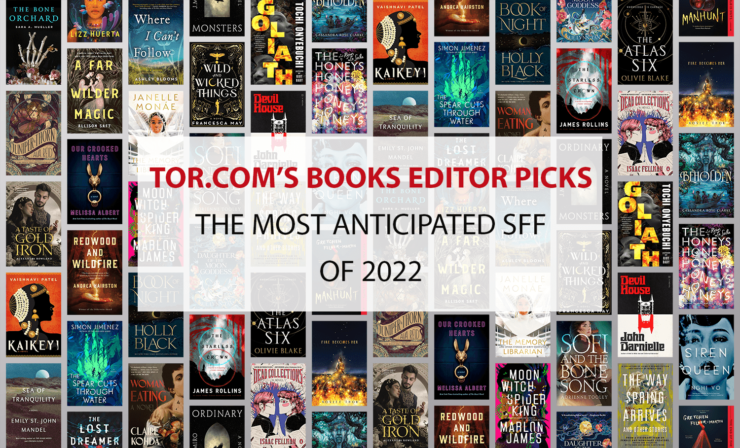I’ve spent a lot of time with my books this year.
I mean, more than usual. It is my job, after all, to spend time with the books. But I’ve also moved into a new apartment that doesn’t have bookshelves yet. My books spent the majority of this year on the floor in piles stacked precariously high, on a temporary shelf that cracked under the pressure, and now in a sort of stalagmite formation in my bedroom as I figure out where to put them. In a lot of ways, this is a good problem to have—there are many books in my life, and I deeply love all of them, and I want them to be safe on a shelf and properly displayed. But the process of crafting a bookshelf situation that works for me and holds everything I need it to (do you know most purchasable shelves only hold 25lbs worth of stuff?? They are clearly not made for book hoarders like me. What is that, a bookshelf for ants??), I’ve come to realize how essential they are to my wellbeing. Without my books safe, I feel unsafe and unsettled. They are an essential part of making a space feel like home.
(There’s that famous quote, a room without books is like a body without a soul, which I find very true. Or the John Waters version: if you take somebody home and they don’t have books, don’t fuck them, which is also true.)
Now that I—like many of us—am home more often, I realize how often I turn to the books for comfort. And they’re always there for me.
The beautiful thing is that I am not alone in this experience, even though sometimes I feel like I am. When I wrote to you last, I talked about how our reading habits have changed in the past two years, fluctuating as we adjust to a new world. But the one thing that hasn’t changed is the human imperative to tell stories, and to share stories with each other. The community I have found through loving books is full of strong, wonderful, creative, clever people, and the experience of reading alongside them is like none other. I’m always looking forward to the next story we’ll love together.
That being said, there are so many good books coming out in 2022, and these lists are fucking painstaking to make because of it. It is like choosing favorite children.
So think of this less as a be-all-and-end-all list, and more of a preview of what’s to come. I can’t wait to add them to my shelf, and hear all about the titles you choose to add to yours.
And, before you freak out, this list is only for the first half of the year, January through June. Because you’ll notice some big absences (R.F. Kuang’s Babel, for instance, or The Book Eaters by Sunyi Dean, which I am positively obsessed with). But we’ll circle back in the summer for the rest, okay?
Now, let’s dive in.
There are some really great new titles coming up from some of our favorite genre masters, including Gallant, a new YA from V.E. Schwab (March); The Kaiju Preservation Society from John Scalzi (March); The Hunger of the Gods from John Gwynne (April); All the Seas of the World by Guy Gavriel Kay (April); the next in Sarah J Maas’ adult Crescent City series, House of Sky and Breath (February); Servant Mage from Kate Elliot (January); Nnedi Okorafor’s Akata Woman (January); Lakesedge by Anna-Marie McLemore (March); a short story collection in the Expanse universe from James S. A. Corey, Memory’s Legion; How to Sell a Haunted House, a new horror story by Grady Hendrix; Quantum of Nightmares by Charles Stross, a new entry into the Laundry files (January); the next Dandelion Dynasty book, Speaking Bones from Ken Liu (June); Don’t Fear the Reaper by Stephen Graham Jones; and two from Seanan McGuire: Where the Drowned Girls Go, a new Wayward Children novella (January), and Seasonal Fears, the sequel to Middlegame (May).
Speaking of sequels, I know we’re all yearning for Nona the Ninth, the latest addition to Tamsyn Muir’s Locked Tomb series. To tide you over in the meantime, we’re also getting the next in Charlie Jane Anders’ YA series, Dreams Bigger Than Heartbreak; For the Throne, the follow-up to Hannah Whitten’s dark fantasy romance (June); the next in Rebecca Roanhorse’s Between Earth and Sky series, Fevered Star (April); Akemi Dawn Bowman’s next installment of the Infinity Courts series, The Genesis Wars (April); The Thousand Eyes, A.K. Larkwood’s follow-up to The Unspoken Name (February); The Legacy of Molly Southbourne from Tade Thompson (May); The Dream Runners by Shveta Thakrar (June); The Void Ascendant from cosmic horror champion Premee Mohamed (March); Ashes of Gold, the sequel to Wings of Ebony from J. Elle (January); Bitter from Akwaeke Emezi, marked as Pet #0.5, which I love so much (February); Our Lady of Mysterious Ailments from T. L. Huchu (March); the next in Sylvain Neuvel’s Take Them to the Stars series, Until the Last of Me (March); An Unreliable Magic, Rin Chupeco’s sequel to Wicked as you Wish (March); A Cruel and Fated Light from Ashley Shuttleworth (May); A Mirror Mended, the next shattered fairy tale novella from Alix E. Harrow (June); This Wicked Fate by Kalynn Bayron (June); and Godslayers by Zoe Hana Mikuta (June).
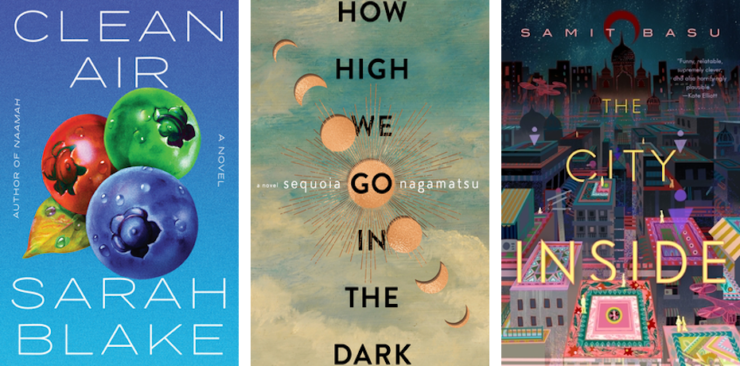
The other thing I want to mention is, I’ve run into a bit of a problem. Truthfully, at the start of the year I was feeling good, hopeful, and energized. But I wasn’t prepared for how uncomfortable I’d feel trying to read a very specific type of near-future sci-fi. Whether the story took place specifically after a pandemic/virus, or it was just some event that caused mass casualties, or if there was any mention of masks—I froze up. I hate that I did, because some of these books were so wonderfully written and I was excited about the premise, and also I know logically that they were written a few years ago. But my brain just couldn’t handle it. That’s just where I personally am at right now, but that doesn’t mean it should stop you from diving in, if you feel ready. There are a few books that I want to highlight within this category that deserve your love and attention: Clean Air by Sarah Blake (February 8), How High We Go in the Dark by Sequoia Nagamatsu (January 18), and The City Inside by Samit Basu (June 7) are fantastic stories, so please do not let them pass you by. I look forward to returning to them some time soon.
With so much to look forward to, you can understand why it’s nearly impossible to narrow the list down to just 30 titles. But, joke’s on you, that’s why I do two of these per year instead of just one!
Here are the titles I hope you keep an eye out for during the first half of 2022:
The Starless Crown by James Rollins (January 4, Tor Books)
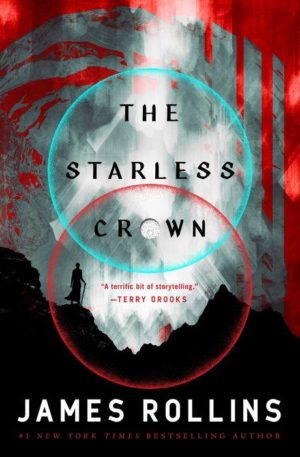
I can’t remember exactly when my friends on the publishing side of things started yelling about fighting the moon, but trust me when I say there simply could not have been a better quick pitch for this book. Coupled with one of my all-time favorite story elements, a ragtag group of outcasts banded together, The Starless Crown is sure to put the epic in epic fantasy. There’s a great cast of characters to fall in love with, including the near-blind and too-clever-for-her-own-good Nyx, escaped prisoner Rhaif, loveable dirtbag Prince Kanthe, and strong and steady Graylin. The Starless Crown invites readers into a rich world with plenty of lore to invest in. And maybe they fight the moon. Who’s to say!
The Beholden by Cassandra Rose Clarke (January 18, Erewhon)
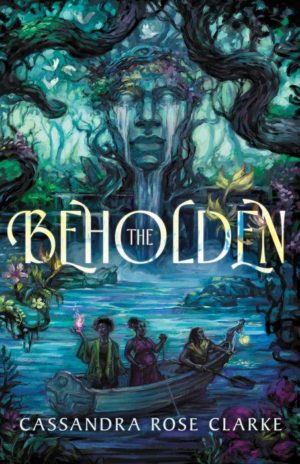
Two sisters strike a deal with a river goddess, the Lady of Seraphine, for a wealthy husband for Celestia, so that they can keep their family’s land and restore the honor of their name. But in doing so, they become beholden (get it?) to The Lady for a favor. Because, you know, magic always has a cost, especially when that magic is wish-granting. Ico, their ferryman and guide, didn’t really want to be dragged into this, but he was, and so when The Lady comes calling, the three of them (Celestia is fully pregnant at this point, and Izara is studying magic) come together again to pay their debt and stop a god from waking the dead. It’s a brilliantly written quest that covers some expansive territory, and Ico, our not-pirate-anymore guide, is just a damn delight. You’re gonna love it.
Daughter of the Moon Goddess by Sue Lynn Tan (January 11th, Harper Voyager)
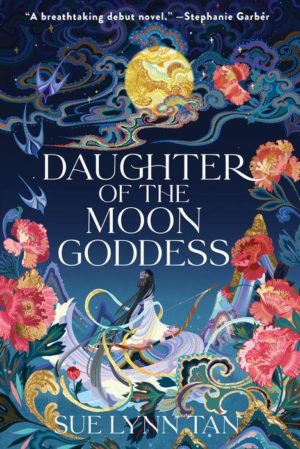
I am but a simple reader, easily pleased. I like fantasies about the moon, that powerful, un-photographable babe. I am especially a sucker for stories inspired by the myth of Chang’e, the Chinese moon goddess who longs for her sexy archer husband from the sky. Sue Lynn Tan writes of Chang’e’s daughter, Xingyin, who has grown up on the moon alongside her goddess mother. But she is forced to leave when her magic exposes her existence, because it turns out her mother is imprisoned up there on the moon, having been banished by the Emperor who isn’t so pleased about having two powerful women to deal with, potentially. Xingyin begins to forge a path of her own, finding archery and music and romance, and maybe also dealing with this evil Emperor along the way. Told like a beautiful fairy tale, Sue Lynn Tan’s fast paced coming-of-age tale is so special and full of magic, both familiar and new, that you simply won’t be able to put it down.
Goliath by Tochi Onyebuchi (January 25, Tordotcom Publishing)
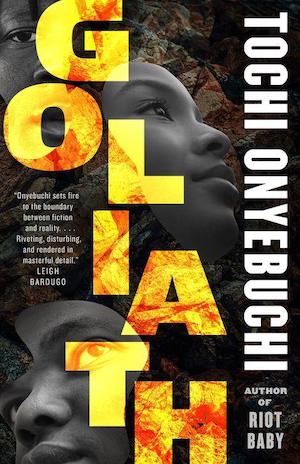
It might be surprising to hear that this is Tochi Onyebuchi’s debut adult novel. He’s so widely published, in many genres and formats, that Goliath seems like a natural progression—and in a lot of ways, it is. But Goliath is also a significant leveling up. In this all-too-near future, wealthier humans have begun leaving Earth in favor of domed space colonies. On earth, houses are being knocked down, and the people left behind are trying to make the best of of what’s left behind. Goliath weaves through different character’s prospectives, through timelines, and through memories to create a narrative of race and gentrification and economic disparity. It’s a biblical retelling, but in Onyebuchi’s hands, Goliath mixes inventive near-future sci-fi elements into a story that covers all shades of human emotion, the best and the worst of us. Tochi may have written a perfect novel. But don’t tell him I said that.
Devil House by John Darnielle (January 25, MCD)
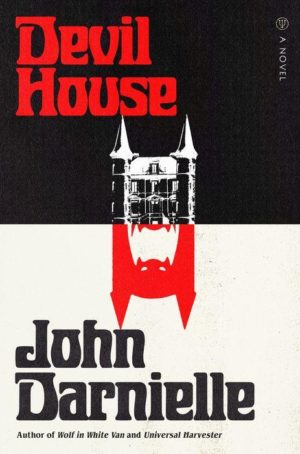
This is the third novel from John Darnielle, the publishing industry’s favorite musician, who is establishing himself as a leading voice in the horror genre. He’s so good at diving into a niche interest—in this one, true crime—and excavating the human mindset around it. Devil House follows Gage Chandler, a true crime writer who got famous for bringing a local legend into the spotlight. For his next book, he gets convinced to move into a house in California dubbed “Devil House”, which was the site of a double murder in the 80s, thought by locals to be the result of teenage devil worshipping. Darnielle’s novel blurs the line between fact and fiction as it delves into the voyeuristic obsession with true crime, and mythmaking around real horrors. Devil House is suspenseful and smart, with a wonderfully slow build.
Manhunt by Gretchen Felker-Martin (February 22, Nightfire)
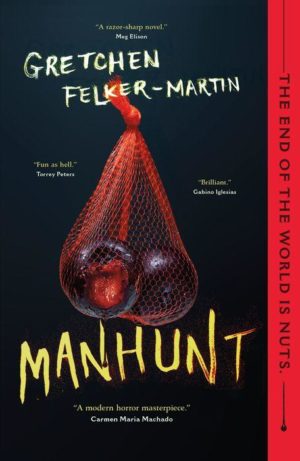
Manhunt is both a post-apocalyptic horror story and a fantasy—specifically a trans fantasy, because whomst among us hasn’t dreamed of physically fighting the TERFs? Gretchen Felker-Martin introduces us to Fran and Beth, two trans women who hunt men like they’re wild animals, because they pretty much are as they’ve been taken over by a virus that targets testosterone-havers and turns them rabid. The TERFs—trans exclusionary radical feminists, for those who are unfamiliar with the term—feel superior because of their biology, sporting XX tattoos and all. Later, Fran and Beth meet Robbie, a transman, all of them dealing with the effects of t-rex (the virus). It’s an apocalypse unlike anything you’ve seen before, and Felker-Martin absolutely tears into gender-essentialist thinking with humor and heart. It is at times gruesome, sometimes very sexy, and always focused on the lives of trans and nonbinary people, who are so often left out of narratives like this. To say Manhunt was refreshing would be an understatement.
Fire Becomes Her by Rosiee Thor (February 1, Scholastic)
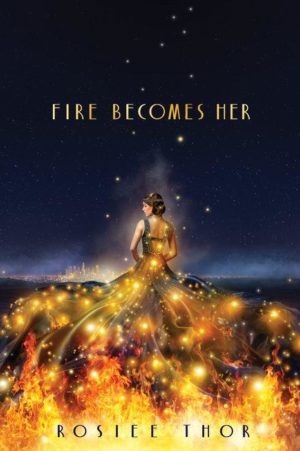
I feel like I’ve been waiting forever for this book, so I’m thrilled to finally get my hands on it. Rosiee Thor’s Jazz Age-inspired world features fire magic that is only accessible by the rich. Ingrid decides her best option is to use a young heir for his wealth and connections, but in doing so, she gets caught up in a fierce political battle. It’s a charming and evocative commentary on class and the mess that is politics, and Ingrid is messy herself—ambitious, conniving, and determined to better her circumstances no matter what it takes. Thor is definitely challenging the idea that female characters have to be “likable” to be engaging, which I absolutely love to see. Fire Becomes Her is a book you’ll absolutely eat up.
Redwood and Wildfire by Andrea Hairston (February 1, Tordotcom Publishing)
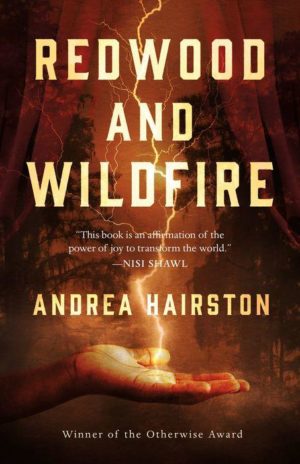
There simply are not enough fantasy novels with hoodoo-based magic systems in the world, and so Andrea Hairston’s newest novel brought me so much joy. In this, Redwood Phipps is a hoodoo conjurer woman with immense power—she stops a storm in the palm of her hand within the first few pages—who is still coming into her own when she meets Aidan Cooper. His belief in her capabilities empowers her. Throughout the narrative, both Redwood and Aiden journey to find their place in the world, to battle their ghosts—both real and emotional—and to heal through magic and music. Redwood and Wildfire is hazy and dream-like, with characters that vibrate off the page. Hairston’s capability as a writer is on full display here, and she’s crafted a story that blurs the lines between reality and fantasy, and reads like a beautiful love letter to the magic of art and performance.
Moon Witch, Spider King by Marlon James (February 15, Riverhead)
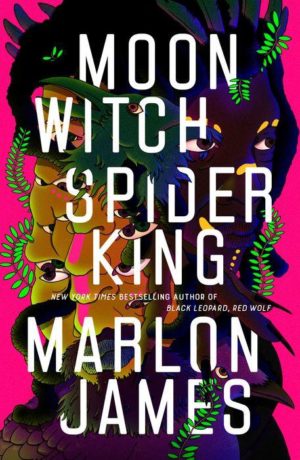
I was going to say, it’s been many years since the publication of Black Leopard, Red Wolf, Marlon James’ decadent quest fantasy. But that was actually only 2019. It just feels like forever ago now. So of course it’s exciting to have Moon Witch, Spider King now, which tells the story from the perspective of Sogolon, the titular Moon Witch (it’s the titular role!). In fact, James has crafted each entry into the Dark Star trilogy to be a standalone, and each told from a different perspective. It’s a fascinating way to write a series and to discuss how one interpretation of events changes the way we feel about the narrative at hand. It is about voice and memory and what truth really means. Told with enchanting prose, James’ latest is just another example of his masterful craftsmanship. Also, for all you second world fantasy nerds, my galley promises SEVEN maps to come in the final edition. SEVEN. Talk about a world to get lost in.
Where I Can’t Follow by Ashley Blooms (February 15, Sourcebooks Landmark)
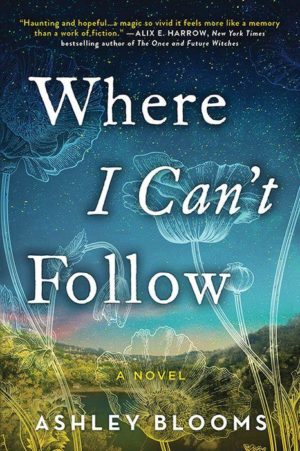
I don’t know about you, but I love a portal fantasy. I especially love all the ways writers subvert the traditional portal fantasy format and use that narrative device to talk about what it really means to escape, and if the worlds beyond ours would really be better. In Where I Can’t Follow, the sophomore novel from Ashley Blooms, main character Maren’s life is tough. She’s struggling with money, and acts as caretaker for her aging grandmother. She doesn’t have many options, and the bills are piling up. But she does have her little door—which, until she chooses to open it, is floating close by her at all times. But she knows that if she goes through, she’ll never come back—just like her mother did when she was young. Maren’s door has a personality of its own—it’s warm and comforting as it floats along beside her, but is also an ominous presence in her life. She knows that eventually she must choose—her reality, or an unknown place beyond. Blooms’ narrative verges on the surreal, and the suspense around Maren’s decision drives the narrative. It’s a book that asks, how bad does it have to be in order for someone to take that leap? And what do we owe the people we might leave behind?
Dead Collections by Isaac Fellman (February 22, Penguin)
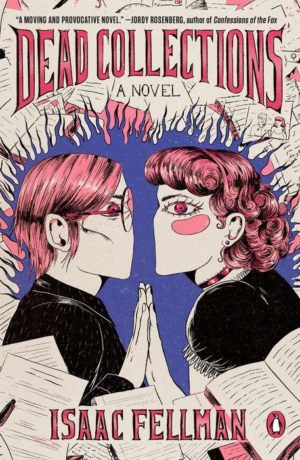
Listen. I’m not saying that I want to be a vampire who lives in the archives, but I’m not not saying that either. So Dead Collections is right up my alley. Our vampire here is Sol, who lives and works in the basement archives for a historical society. He immediately feels something for Elsie, who has come to donate her dead wife’s things, and who—get this—works for the Organization for Transformative Works (better known as AO3). So she’s sort of an archivist in her own way. This book is not only nerdy as hell, giving love in equal amounts to the preservation of primary documents and the importance of fandom, but a sweet and intimate look at two people connecting over shared interests and experiences. Dead Collections explores transness, chronic illness, and grief, but it also spends time on the gentle, warm parts of life—just as Sol spends time with his hand in hot water to warm it up enough for a handshake.
The Atlas Six by Olivie Blake (March 1, Tor Books)
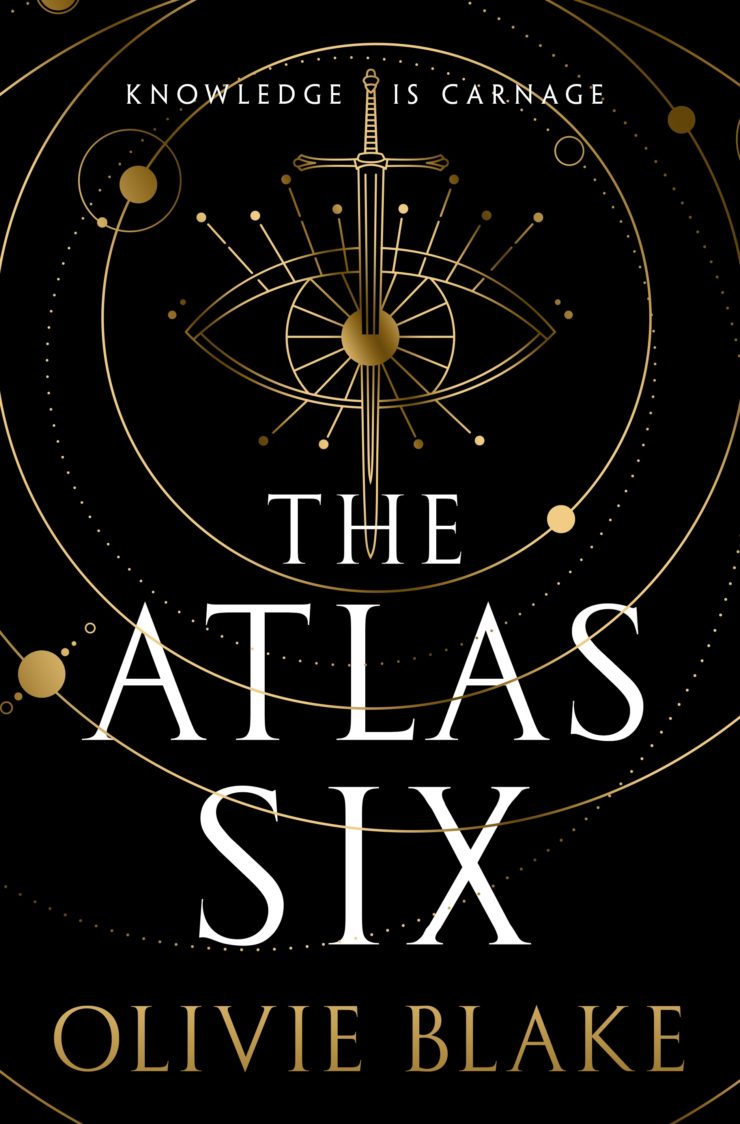
So, you’re thinking to yourself: gee, it’s been a long time since I’ve gotten deeply invested in a book, like to a fandom level. Maybe it’s been a while since you’ve read something with such a gripping story, inventive magic, such an enchanting world—and multiple intensely shippable pairings. Well, I’ve got good news for you! I’m the type of person that gets jealous when a fantasy world is so good, because I want to be there and exist inside of it, and The Atlas Six‘s magical Library of Alexandria made me almost mad because I wasn’t there alongside Libby, Nico, Reina, Tristan, Callum, and Parisa—six magically talented young adults who are plucked out of their successful-yet-unsatisfying lives to compete for a chance to join the Alexandrian Society. All six of these characters are ambitious, creative dirtbags, and I love them all so much, and I can’t wait for you all to love them too. I mean it. Send me your fanfiction or fanart when you’re done.
The Lost Dreamer by Lizz Huerta (March 1, Farrar, Straus and Giroux BYR)
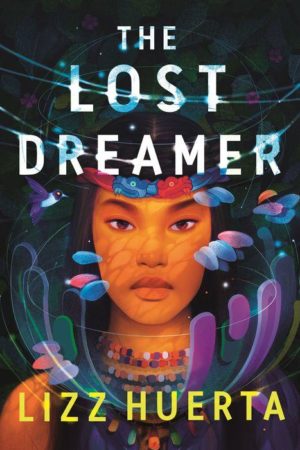
I am so excited to tell you about this one, because Lizz Huerta has delivered a magical, adventurous Latinx fantasy in such a spectacular way I had to put it down several times just to catch my breath. The prose is so beautiful and the descriptions of this world are so vivid, you’ll forget that hot tea you just set down on the table next to you. The Lost Dreamer follows two girls: Indir, who comes from a family of Dreamers and is surrounded by powerful women, but can no longer dream herself; and Saya, who only just barely understands her Dreaming capabilities, and is taken advantage of by her con woman mother. As their two worlds collide, they begin to learn the truth about themselves, and also go up against a real douchebag of a king. Oh, and there are shape-shifting jaguar women. The Lost Dreamer is about powerful girls and women, and is an intense exploration of family, destiny, and self-actualization.
A Far Wilder Magic by Alison Saft (March 8, Wednesday)
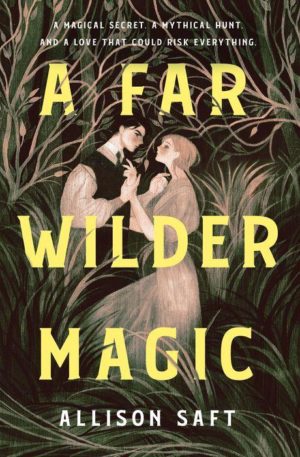
Please know that what I’m about to say, I don’t say often: A Far Wilder Magic felt so original, and it was so good to read. Reading this was like breaking open freshly baked bread—both comforting and complex at the same time. The magic in this world is actually alchemy, and young Wes is determined to become an alchemist to help his family—only he can’t seem to hold down an apprenticeship. Margaret’s mother is one of the most well-known alchemists in the country, but has left her daughter behind to fend for herself. Fortunately, the ceremonial hunt organized after a sighting of a rare magical creature presents an opportunity for both of them to prove themselves—if they can manage to qualify. Alison Saft has crafted a romantic fantasy with a genuinely swoon-worthy male lead, and the enemies to begrudging partners to lovers storyline is based on mutual respect and a real connection. It’s about family and belonging, loneliness, and finding ones own path. And it’s just a delight through and through.
The Way Spring Arrives and Other Stories edited by Yu Chen and Regina Kanyu Wang (March 8, Tordotcom Publishing)
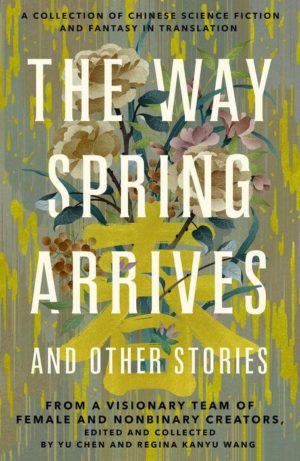
This is a story collection like no other—not only is it completely written, edited, and translated by female and nonbinary creators, but interspersed with the translated Chinese speculative fiction are essays about the art of translating, as well as various facets of Chinese SFF. This collection contains stories both historical and contemporary, fantastic and surreal, and the care that was put into making it is evident on every page. With an incomparable list of contributors, this is an essential book for every SFF lover’s shelf.
The Bone Orchard by Sara A. Mueller (March 22, Tor Books)

You know that feeling you get when you open a new book, and you know from the very first sentence that this one is going to grab your heart and never let go? I felt that way about The Bone Orchard. Not only is it perfectly gothy, as it centers on Charm, the madame of a brothel who re-grows her girls with the magic provided from the bone trees, but the prose is just astounding. The story blossoms on every page, with sentences so exquisite you’ll have to go back and re-read them over and over again. Charm’s long-term love affair with the Emperor means she’s the only one he trusts to discover which of his shitty sons has poisoned him. On his deathbed, he grants her freedom in exchange for solving the mystery. What unfolds is a masterful, character-driven story that will absolutely take your breath away.
Wild and Wicked Things by Francesca May (March 29, Orbit)
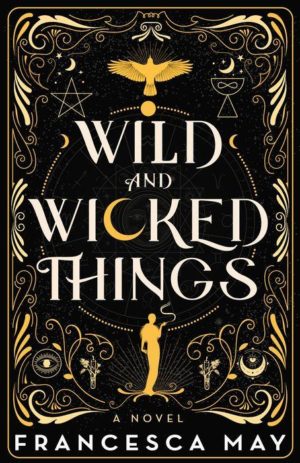
When Annie inherits her estranged father’s estate, she leaves the safety of home and ventures out to his place on Crow Island—an island that is rumored to be full of prohibited magic, and not just the faux kind created for tourists. Annie sees this as an opportunity to turn her life around—for wealth, hopefully, because she’s lost almost everything, and an opportunity to connect with her long lost friend Bea. But Crow Island has plans for Annie, and magic isn’t the only forbidden temptation. Wild and Wicked Things is part The Chosen and The Beautiful and part A Discovery of Witches, with a big case of the “Oh No She’s Hot”s. Oh, wait, I almost forgot to mention the most important part: the love interest is a hot butch lesbian witch. Are ya sold yet? Cuz I sure as hell am!
Sea of Tranquility by Emily St. John Mandel (April 5, Knopf)

I’m going to be honest with you. I was prepared to have to put this one down, as it partially falls into the pandemic/virus book category that my brain cannot handle right now. But it’s only a small slice of the pie that makes up Emily St. John Mandel’s latest masterpiece. In her signature style, this novel is subtle and quiet, and choses to focus on the personal. Sea of Tranquility takes its name from the moon’s Sea of Tranquility, as the novel partially takes place on the moon colonies of the future where humanity continues to grow and thrive. The way Mandel writes about pandemics is almost self-referential: as part of a story within the story, written by a writer from the early moon colony population. But the narrative spans time periods and generations, all connected by an inexplicable anomaly. It is an existentialist novel, but also a novel about family and connections and reality. Mandel’s spectacular prose highlights the strangeness of life and the importance of little moments, and all the little ways humanity survives.
The Memory Librarian: And Other Stories of Dirty Computer by Janelle Monáe (April 19, Harper Voyager)
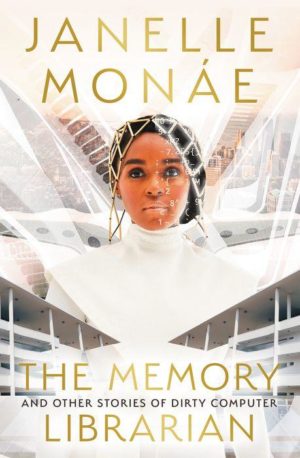
I don’t really think I need to explain why this one is on the list but, here we go. Janelle Monáe’s 2018 album Dirty Computer came accompanied by a short sci-fi film, or “emotion picture”, which told the story of which told the story of a young woman whose memories were being erased in an effort to make her compliant with the system. Now, Monáe has collaborated with a group of incredible Black women and nonbinary writers, including Alaya Dawn Johnson, Yohanca Delgado, Dr. Eve L. Ewing, Danny Lore, and Sheree Renée Thomas, on an Afro-futurist story collection within that same universe. Monáe’s work has always leaned toward the speculative, and with a collaborator line-up like that, this collection that centers identity and freedom is sure to completely capture our imaginations.
Woman, Eating by Claire Kohda (April 12, HarperVia)
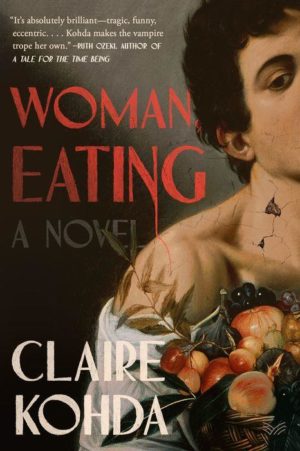
I have to say, this one snuck up on me. It’s a quiet, almost domestic meditation on humanity and self-actualization, told from the perspective of Lydia, a young vampire, as she leaves the safety of her mother’s home for the first time in her life. I do want to give a warning here for anyone who may be recovering from an eating disorder—Woman, Eating deals a lot with food, hunger, and Lydia’s relationship to her body. But this novel also deals with spiritual nourishment, art, womanhood, shame, and identity. As Lydia comes into her adulthood, she’s learning to take care of herself in a world that isn’t made for her—in more ways than one—and it’s complicated to say the least. Kohda’s prose is so careful and earnest and will take you on a deep emotional journey. Trust me, this is not your average vampire story—it is a novel that displays the incredible breadth of what speculative fiction can show us about the human condition.
Sofi and the Bone Song by Adrienne Tooley (April 19, Margaret K McElderry)
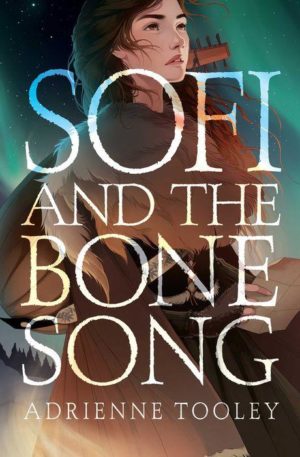
I love a bard, I really do, I love stories about bards and I just don’t think they get enough credit for how essential to a quest they are. Adrienne Tooley clearly understands me and agrees—because Sofi and the Bone Song is all about a troubadour (the aforementioned Sofi) who is destined to take over her father’s position as a state-approved musician. But an unexpected rival swoops in at the last minute to take the title. Believing her new nemesis, Lara, is using magic she shouldn’t be, Sofi gets ready to take her down. But of course, things aren’t always what they seem, and sometimes rivals are…well, really hot. Tooley has written a cozy fantasy full of taverns and music and intimate moments. It’s about art and the way art has the power to connect us all. Sofi and the Bone Song is sure to delight and enchant.
Kaikeyi by Vaishnavi Patel (April 26, Redhook)
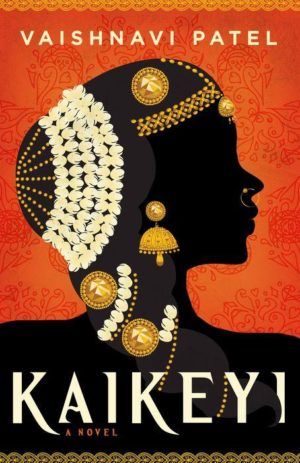
It’s really exciting to see a new surge of retellings being published that diverge from the typical Grimm-Christen Anderson-Barrie-GrecoRoman canon. Kaikeyi’s story is from a well known Hindu epic, the Ramayan, but is a story rarely highlighted by Western publishing. But it’s about damn time we see mythological women from non-western traditions given the Circe treatment—especially women characters who were given the short end of the stick in the original. Vaishnavi Patel has done that and so much more, telling a story of a woman and the choices she makes, some of which are not really choices at all. Kaikeyi is truly epic, and I would like six million more pages of this, thank you.
Book of Night by Holly Black (May 3, Tor Books)
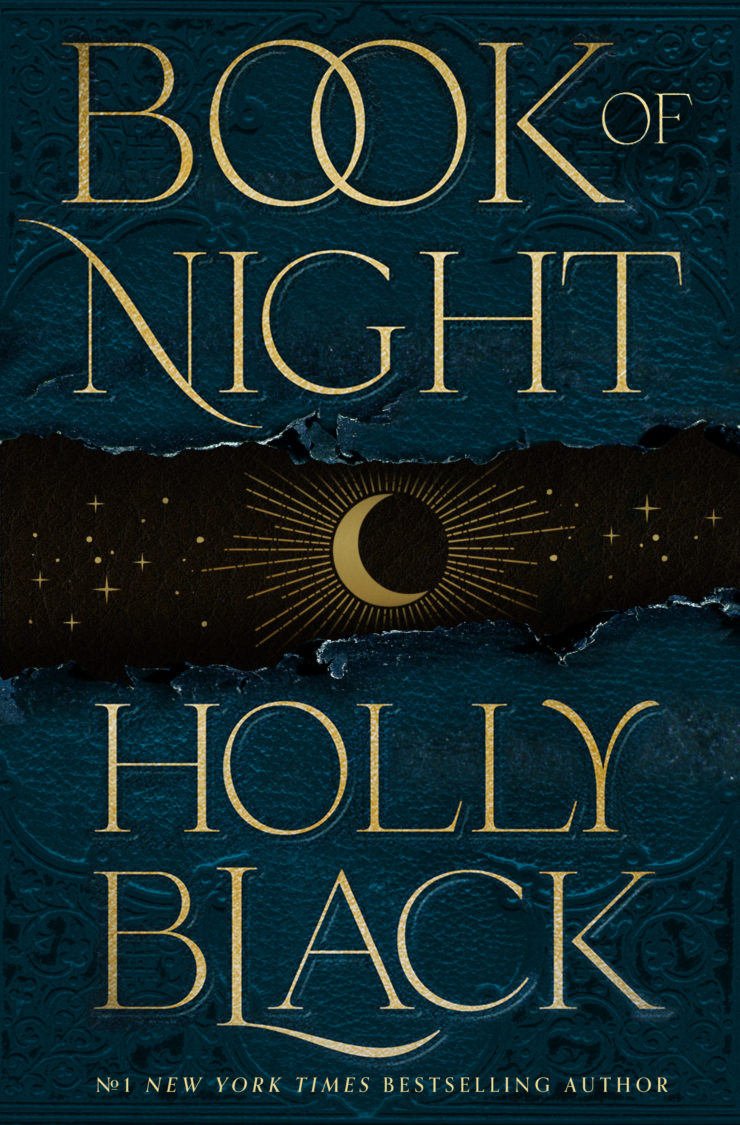
Is there a professional way of saying Holly Black really did that shit? Because she did. It’s like she said, “if I’m gonna write for adults I’m gonna DO THE DAMN THING”, and Book of Night is that damn thing. In this world, shadow alteration is commonplace—a cosmetic procedure that allows for magical capabilities, physical changes, and emotional manipulation. But of course, with such desirable magic, there’s danger lurking beneath, and plenty of people who would use that for less-than-savory motives. Charlie, a thief, comes home from her bar shift and stumbles upon a gruesome murder scene—and it just might be connected to all the other terrible goings-on she’s been hearing about. Book of Night is an urban fantasy with a dark and complex magic system, and it really is Holly Black at her best. I cannot describe to you the feral scream I let out when I learned there was going to be an adult Holly Black, and I can’t wait for you all to read it so we can scream together.
The Spear Cuts Through Water by Simon Jimenez (May 3, Del Rey)
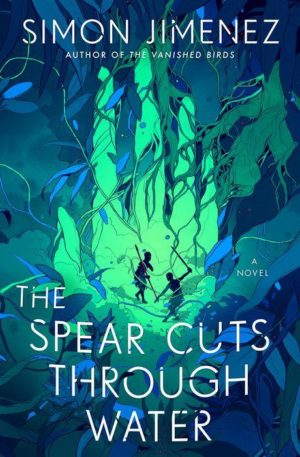
Simon Jimenez’s first novel, The Vanished Birds, was a delightful surprise, so I’m thrilled that we’re getting a second novel finally (again, The Vanished Birds came out in January 2020, which was approximately eighty billion years ago). The Spear Cuts Through Water is an epic fantasy that follows two warriors on a quest to take down an emperor—which, like, I get it, sounds like a fairly standard premise. But Jimenez finds such inventive and complex ways to tell his story, told from multiple perspectives and styles—and these are not your average POV shifts. It deals with the ways history and culture is shaped by the people in power, and how each player can make an impact. Jimenez is a skilled writer with a talent for weaving narrative threads carefully and beautifully, and is sure to impress over and over again.
The Honeys by Ryan LaSala (May 3, Scholastic)

Ryan La Sala has been jumping from genre to genre over the course of his blossoming career, and The Honeys, though categorized as horror, defies genre within itself as well. The Honeys takes place at a summer camp, where young genderfluid Mars arrives to discover what happened to his now dead twin sister. The camp is an escape from reality—sort of—a fantasy of sunshine and friendship, where darkness and distrust lurks underneath. Mars finds the cultish beekeeping girl gang dubbed “the Honeys”, who knew his sister, and is drawn into their world. Unfortunately for Mars, there are strict gender expectations and heteronormativity to fight against, and that’s on top of just how horrible teenage girls can be. Things get troublesome, to say the least. The Honeys is like a twisted dark academia mixed with The Heathers, with La Sala’s signature dramatic flair. And it’s arriving just in time for summer—perfect for reading outside, with the bees buzzing around you.
Siren Queen by Nghi Vo (May 10, Tordotcom Publishing)

I’m just going to gently grab your face because I need you to pay attention to me right now, okay? Nghi Vo is one of the best writers we have, period. The level of sophistication in both prose and plot is unparalleled, earth-shattering, transcendent. It is just so, so so bonkers good. In Siren Queen, Vo takes on the glittering mystery of Hollywood, where a young Luli Wei (inspired by Anna May Wong) stumbles onto a movie set and begins, almost accidentally, a career in film. Film, like her father’s special remedies, offer a type of immortality—but at a cost, of course. Because people are terrible to each other, especially when it comes to holding on to or gaining power. But fame and glamour are too much to say no to, and Luli is drawn in with few regrets. Siren Queen presents a world where the magic is subtle and commonplace, and I would go so far as to call this magical realism, a term I do not throw around because it is so often misused. Vo tells a story of identity and strength in a world that is so often dark and cruel. Siren Queen is, simply, gorgeous from start to finish.
Ordinary Monsters by J.M. Mrio (June 7, Flatiron)
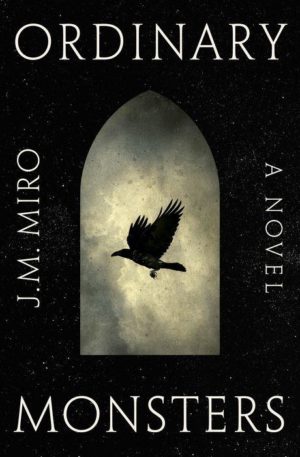
There are many ways I could describe this book. It’s like the Umbrella Academy meets Penny Dreadful. It’s like A Darker Shade of Magic meets X-Men. It’s a gaslamp fantasy about orphans with special powers—or “talents”, in this case—all brought together to a mysterious institute to hone their abilities. It’s a chunky book that’s creepy and tender and mysterious in all the best ways. But the most important thing I could say is that Ordinary Monsters is special. J.M. Mrio has crafted a tale that spans time periods and dimensions, with high stakes and incredible worldbuilding. Make space for it on your shelf. A big space. I mean like maybe a good three inches.
Juniper & Thorn by Ava Reid (June 7, Harper Voyager)
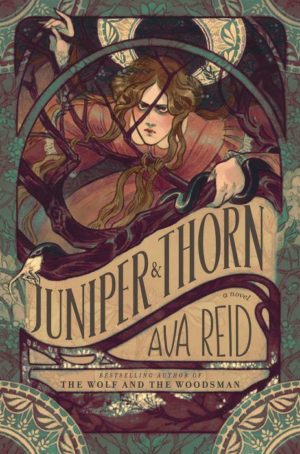
The Wolf and the Woodsman was one of my favorite reads of 2021, and so you better believe that I’ve been gagging for Ava Reid’s next novel. This is set in the same universe as The Wolf and the Woodsman, but stands entirely alone as a retelling of “The Juniper Tree” (which is deeply fucked up in its original form, just as a warning). Reid’s skill at balancing magic and modernity, folklore and religion, and romance and horror is singularly impressive. Juniper and Thorn is a gothic tale that follows Marlinchen, a witch kept locked away by her horrible father along with her sisters. But they find ways to get free and find lives of their own. There are traumatic things in Marlinchen’s life, but a charming romance too, and a character growth journey full of unexpected twists. Ava Reid is one of those writers I will be auto-buying going forward. Don’t be surprised if you see her name on next year’s list too.
A Taste of Gold and Iron by Alexandra Rowland (June 21, Tordotcom Publishing)

Alexandra Rowland really did not have to go this hard, but they did, and they did it for us. Thank you, Alex. Not only did they write up two super hot romantic leads (the soft Prince Kadou, who is just trying to do the right thing, and his strong, rule-abiding bodyguard Evemer) who slowly learn to trust and depend on each other, but A Taste of Gold and Iron also features one of the best portrayals of anxiety that I’ve ever read. The way Kadou’s constant worrying and debilitating panic attacks made me fall head-over-heels for him, because I get that, and I get how difficult it is to trust someone when anxiety has such a hold on you like that. It made Evemer’s loyalty even more meaningful and romantic. A Taste of Gold and Iron is a slow burn that really does burn—the heat is undeniable and beautiful—and will capture your heart at every turn.
Our Crooked Hearts by Melissa Albert (June 28, Flatiron)
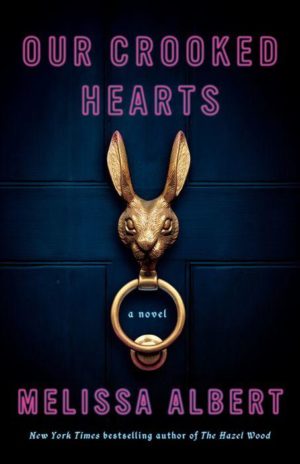
There are few who can write a fairy tale like Melissa Albert, and even less who are so talented at crafting complex mother-daughter relationships. When Ivy discovers something about her mother she’d probably be better off not knowing, it may be the reason for all the weird things she’s been seeing lately. But weird happenings and secrets run in the family, so when her mother and her favorite aunt go missing, Ivy is quickly caught in the middle of some dark magic. Our Crooked Hearts follows multiple generations of women—vindictive, outcasted, curious, ambitious women, written with all the complexity they deserve, through a The Craft-like narrative about dangerous secrets. At its heart, it’s all about the relationship between Ivy and her mother, Dana, but it’s also spooky and exciting, and an absolute page-turner.
It’s going to be a year of wonderful reading! Enjoy, my friends.










